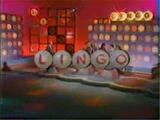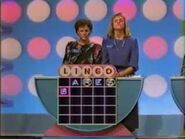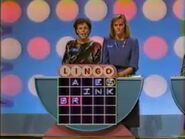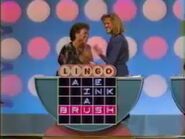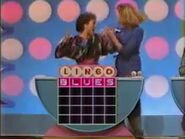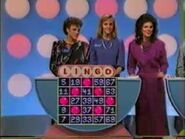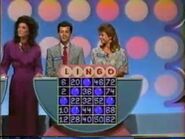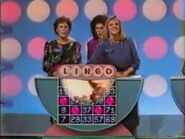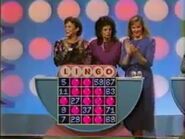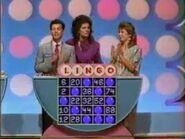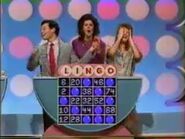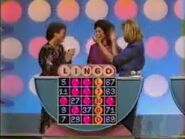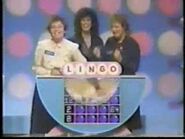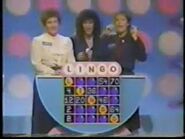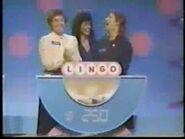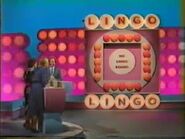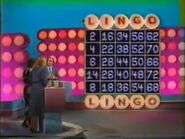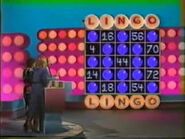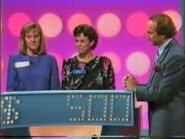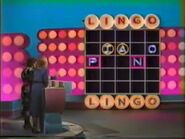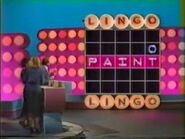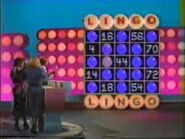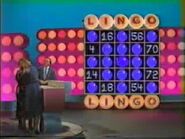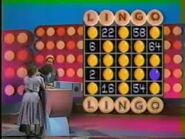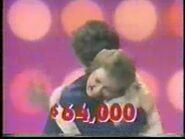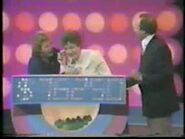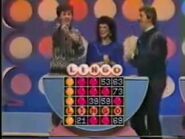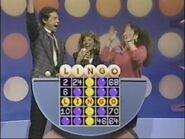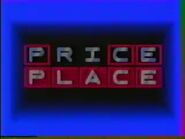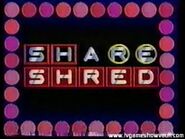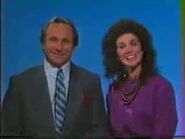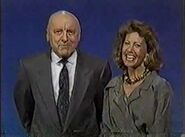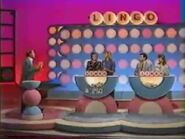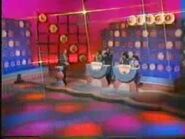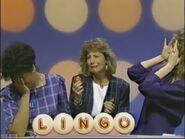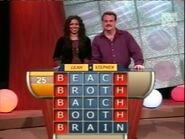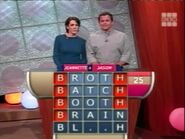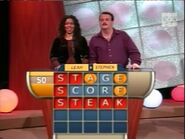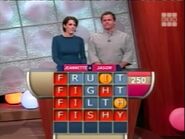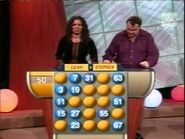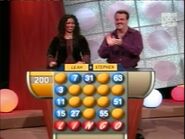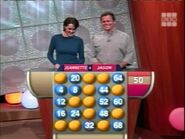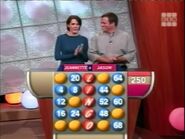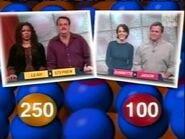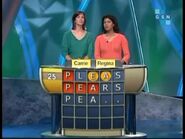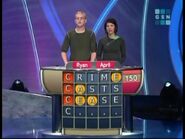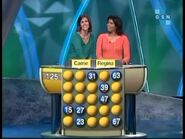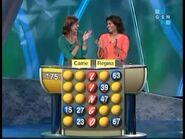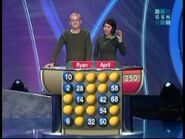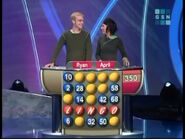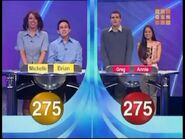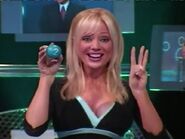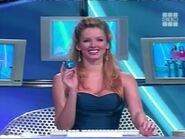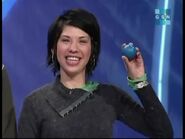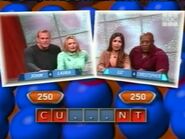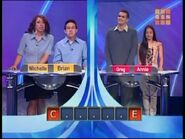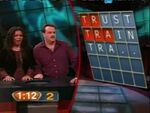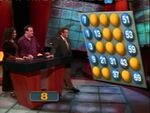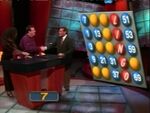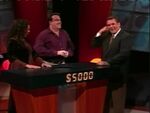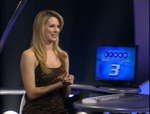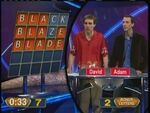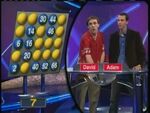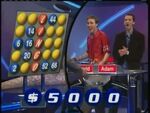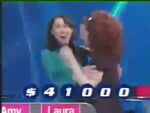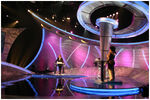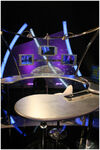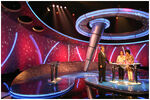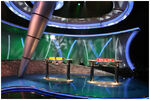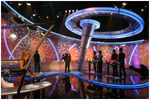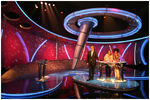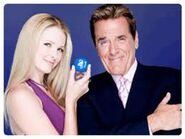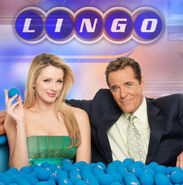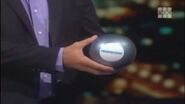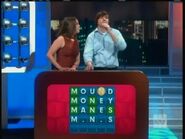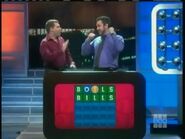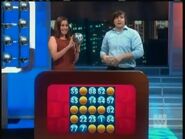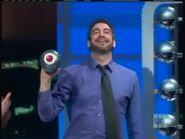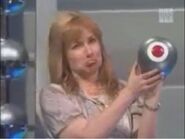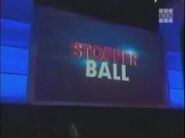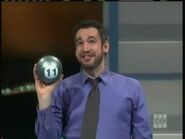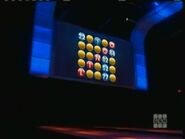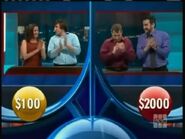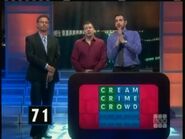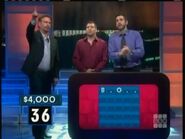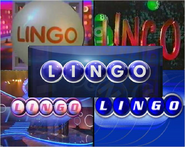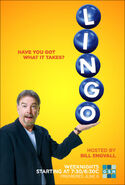| Hosts | |
| Michael Reagan (1987-1988) Ralph Andrews (1988) Chuck Woolery (2002-2007) Bill Engvall (2011) | |
| Co-Hosts | |
| Dusty Martell (1987-1988) Margaux Mackenzie (1988) Paula Cobb (2003) Stacey Hayes (2003-2004) Shandi Finnessey (2004-2007) | |
| Announcer | |
| Randi Thomas (2002-2003) Todd Newton (4/1/2003) Stacey Hayes (2003-2004) | |
| Broadcast | |
| Syndication (Daily): 9/28/1987 - 3/25/1988 GSN: 8/5/2002 - 6/29/2007 GSN: 6/6/2011 - 8/1/2011 | |
| Packagers | |
| Ralph Andrews Productions Bernstein-Hovis Productions CCR Video Corporation (1987-1988) Laurelwood Entertainment (2002-2007) IDTV International (2002-2004) Zoo Productions (2011) | |
| Distributors | |
| ABR (1987-1988) GSN (2002-2007, 2011) | |
Lingo was a game which is played a lot like bingo, except in order to mark your card, you have to guess a five-letter word within five turns to have a chance.
1980s Version
Two teams of two contestants competed in a game of guessing five letter words & making bingo or in this case, "lingo".
Main Game
At the start of each game, both teams received their lingo cards, each one had seven numbers marked off at the outset. The challengers' card consisted of odd numbers with each one covered by a red circle, and the champions' card consisted of even numbers with each one covered by a blue circle.
Now the team in control (with the challengers going first), was shown the first letter of a five letter mystery word behind their card (generated by the show's Amiga computer). All the team has to do is to guess the word, then spell it out (players on the controlling team take turns while doing that). After each guess, the word was analyzed using red squares & yellow circles around the letters; a red square means that the letter is correct and in the right position, while a yellow circle means that the letter is correct but in the wrong position, wrong letters of course are letters with nothing around them.
The team lost control if they don't guess the word in five turns, guess a word that doesn't fit (shorter or longer than five letters), is not a real word, misspell a word, guess a word that can only be a proper noun, or just plain run out of time. If anyone of those things happen, the opposing team gets a shot at the word. When stealing, a free letter was given (in this version it was referred to as a clue letter), but if there's only one blank space left, no free letter was given, but the team did get a five second conference (conferring was generally not allowed except in this situation).
Once the word was guessed, the team who solved that word won that word; and if the team in control guessed the word on the first try, they won $1,000.
The team with a correct guess, also earned the right to pull out two lingo balls out of a hopper in front of them. Eighteen of the balls were printed with the remaining numbers on the lingo card, while three of them were red balls. If and when a contestant on the controlling team pulled out a number ball, the number was marked off the board; but if a red ball was pulled, the team lost their turn. But if they didn't pull out a red ball, and if a lingo was not yet achieved, the team took control of the next word.
In addition to the number balls and the red balls, also in the teams' hoppers were prize balls. When pulled out, the team was credited with the prize and got a free draw. When the show started, there were three prize balls; pulling out one ball was worth $250 in traveler's checks, pulling out another also played for a trip, and there was also one special ball called the jackpot ball, which played for a Lingo Jackpot which started at $1,000 and grew by $500 for every game in which the jackpot was not won. Later there were only two prize balls in the hopper; one was worth a trip, the other was the jackpot ball. And finally, offering a trip was no more, but the jackpot was still in play. To win the jackpot that time around, the team must pull out both prize balls. Prizes pulled out by the team in control was theirs if they win the game.
The first team to make lingo (five in a row) wins the game and $250 plus all the prizes credited.
No Lingo (Bonus Round)
The winning team played a bonus round called No Lingo, so called because the object of the game was to not lingo and win a grand cash prize. To start the winning team was shown a lingo card with the even numbers, and sixteen numbers instead of seven were crossed off & arranged in a star shape with the center number (usually the free space spot in regular bingo) left uncovered. The winning team was given house money to start, and then was shown a five letter mystery word but with two letters revealed at the start (one was as usual the first, and the other was in anyone of the remaining four spaces). As always, the team had five chances to guess the word. Conferring was always allowed in this round. Each chance increased the danger of making lingo, because if they guessed the word, they receive the number of draws according to how many chances it took to guess the word, and missing the word entirely earned seven pulls. The hopper in front of the team consisted of all the bingo even numbers (2 though 74) printed on the balls, plus one very special ball, "The Gold Ball". On each draw, if the number they drew appeared on the board, that number was covered up, but if the number pulled out was a number not showing on the board, nothing happens they just simply drew again. If the winning team survived all the pulls without making a lingo, they doubled their cash, and if they pulled out the gold ball, their money was doubled instantly, plus the gold ball was put back into the hopper (unlike the number balls which were always discarded when pulled out).
After each successful round, the winning team can choose to either take the money and quit or continue playing knowing that if at anytime a lingo was formed, they lose the money (the winning team even got that option at the start of the No Lingo round, and no team refused to take the challenge). Five words were played in this round, so if the winning team guessed and/or got passed all five words and avoid lingo, they win the maximum grand cash prize. The first trip to No Lingo gave the winning team $500 to start, so winning the No Lingo round was worth $16,000. The second attempt gave the team $1,000 to start making the grand prize $32,000. And making it to No Lingo the third and final time gave the winning team $2,000 to start, for a possible grand total of $64,000. Winning teams stayed on the show until they won three times or defeated once; so the winning team could win up to $112,000 in No Lingo alone.
Format Change
In later months of the show, the team that won the main game received money according to how they lingoed. Lingoing vertically or horizontally was worth $500, a lingo that went diagonally won $1,000, and achieving a Double Lingo (two lines that were made using the same number) was worth $2,000. That money became the base amount for No Lingo; so Lingoing vertically or horizontally made the grand prize $16,000, diagonal lingos made the grand prize $32,000, and a Double Lingo went for a $64,000 payoff.
Additionally, there was no limit to how many games a team can win. They simply kept on playing until they lost twice.
This version of Lingo died due to the fact that the show was low on dollars and not many contestants were paid because of it. This version did, however, give way to several foreign versions until at last, fourteen years later, Lingo made its American return.
Other Pictures
GSN Version (2002-2007)
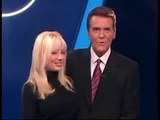
Chuck & Stacey
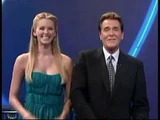
Chuck & Shandi
Fourteen years later, Lingo was back in a brand new format and veteran host Chuck Woolery at the helm. By season three he was accompanied by a co-host. The co-host would also act as announcer. He had two throughout the series with the first being British-born Stacey Hayes, and the second was former Miss USA and one-time Dancing with the Stars competitor Shandi Finnessey. For a brief period in season three, he had a second co-host named Paula Cobb. In season two, the announcer was Randi Thomas, the Hooked on Phonics spokeswoman famous for reminding viewers to call 1-800-ABCDEFG.
Main Game
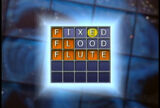
Here's a sample puzzle
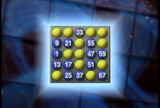
Here's what a typical lingo card may look like.
In this version, teams scored points for each word and for each lingo. The game was played in two rounds, and each one ended when time ran out. Winning teams moved on to play a bonus round where this time, they do have to make lingo in order to win. The teams were dubbed the Yellow Team on the left and the Red Team on the right, similar to Nickelodeon Arcade.
At the start of the game, both teams received their lingo cards, only this time ten numbers were marked at the outset (they were arranged in a certain way so that only one (sometimes two) row(s), column(s) or diagonal(s) would require two numbers to make lingo, while others required three or four). The Red Team's card had even numbers and the Yellow Team's card had odd numbers.
The controlling team still had five guesses to get the word, and failure to solve the word after five tries gave the opposing team what is now called a bonus letter (unless there was one letter remaining in the word in which case it was not given), and a chance at the word. The team also lost control if they guessed a word that doesn't fit, is not an acceptable word (including proper names unless they doubled as ordinary words), misspelled one, or ran out of time.
The team that guessed the word earned points for that word, and the honor to pull out two lingo balls (now colored blue) that are hopefully printed with one of the numbers on their lingo card. Pulling out one of the three red balls still lost their turn (the red balls were referred to by Chuck as stoppers, a throwback to his days hosting Scrabble), but not pulling out a red ball or having yet to score a lingo kept their turn and started another word. Each time a team made lingo, they scored double the points of each word and received a new card, but control of the next word passed to the opponents.
Round 1
In round one each correct word was worth 25 points, and each lingo was worth 50 points.
Round 2
In round two, points were doubled. This meant that correct words were now worth 50 points, and lingos were worth 100 points. Plus to help the teams in making lingo, three question mark balls were added to both teams' hoppers; they act as wild cards, for whenever a question mark ball pulled, the team can select any number to cover up, even the ones that caused a lingo which happened occasionally. When this occurs, the wild-card-replaced number is not removed from the hopper; if it happens to be drawn later, the draw is ignored (for the purpose of game play) and had to be edited out of the show before it is aired.
The team with the most points when time was called in round two, won the game and the right to play Bonus Lingo. If the game ended in a tie, a mystery seven letter word was shown to both teams. The first and last letters were given to start, then each new letter appeared back and forth. The first team to buzz-in took a chance to guess, if they were wrong, the opposing team earned another letter and the right to guess, but if the opposing team was wrong, play continued as normal. Later rules had all letters reveal back & forth, both teams buzzing in as many times as they wished, and somehow though not explained, the contestants spell out the tiebreaker word just like the normal five letter ones. The first team to guess the word won the game.
Bonus Lingo
The Bonus Lingo round was played in two parts.
Part 1
In the first half, the winning team had two minutes to guess as many five letter words as they can (five tries for each word as always). On each word two letters were revealed (one was as usual the first, and the other was in anyone of the remaining four spaces). Any breakage of the rules explained above only wasted a shot, and failure to guess the word in five guesses, caused the word to be revealed and forced the team to move on to the next word. Each correct word was worth $100 and one lingo ball.
Starting in season two, if the team is stumped they can call for a bonus letter. One bonus letter was earned for each lingo made during the main game, plus one more for winning the game. Sometimes the bonus letter they called for would complete the word, and it's happened on several occasions.
Also starting in season two, the team stopped guessing when they solved ten words correctly, for that made it impossible for the team to lose Bonus Lingo. Occasionally, after solving their tenth word, another would briefly appear, as it would have been the next word to contend with, but the players did not have to guess at this word.
Part 2
When the time was up, the winning team was shown another lingo card with a different number of numbers marked off. The winning team used the number of draws to make lingo. Not making lingo won only the money picked up from the first half. Making lingo within the number of pulls won a grand prize, and starting in season two making lingo in one pull won a bigger grand prize.
In season one, 13 numbers were marked off the board; they were arranged in an octo-square with a plus sign inside it, so a team can lingo by pulling out four numbers in the diagonals, three in the top & bottom rows and the left & right columns, and only two in the center rows & center columns. The winning team kept the money won from the first part win or lose, but making lingo won a Borders gift card, an Argus digital camera, a Croton watch and a Cassiopeia EM-500 Pocket PC, all totaling $4,000.
Starting in season two, 12 numbers were covered and arranged in such a way so that only one row or column can allow a guarantee that a lingo can be made on the first pull. Teams can only win the $100/word if they don't make a lingo. Successfully making a lingo now won $5,000 in cash, but making a lingo on the first pull won a bigger grand prize (for the second & third seasons, it was accompanied by the $5,000 cash prize). For season two, the grand prize was a Jamaican vacation package worth more than $10,000. For season three, the grand prize in addition to the $5,000 was a Harrah's Entertainment & casino package in Lake Tahoe.
Starting in season four, the grand prize for making a lingo on the first pull was bigger cash. For season four only, the grand prize was $10,000. For seasons five & six, the grand cash prize was now a progressive Bonus Lingo Jackpot which started at $10,000 and grew by $1,000 for every day it's not won. The largest jackpot won was $41,000.
Tournaments and Special Episodes
GSN held a tournament of champions with particularly successful contestants from its second and third seasons. Instead of playing Bonus Lingo in the final tournament episode, a third round was played in which words were now worth 75 points and Lingos were worth 150 points. The question mark balls from the second round carried over to the third round. At the end of the show, the team with the most points won the tournament and won a Suzuki Verona for each teammate.
A special episode that aired on April Fool's Day in 2003 had the entire roster of GSN's six original show hosts together playing for charity. While Woolery hosted, Mark L. Walberg (Russian Roulette) and Marc Summers (WinTuition) played against Kennedy (Friend or Foe?) and Graham Elwood (Cram), with Walberg and Summers shutting them out 500–0. The sixth host to take part was Todd Newton (Whammy! The All-New Press Your Luck), who served as the show's announcer.
The 4th season featured an entire week of celebrity shows 4 of them, featuring GSN personalities including:
Bill Dwyer & Michelle Merkin vs. Zach Selwyn & Dodgy (all from extreme dodgeball, Dodgy being the shows mascot)
John Ahlers & Lisa Dergen vs. Kathy Liebert & Kenna James (Poker Royale)
Kenny Hotz & Spencer Rice (of Kenny vs. Spenny) each team with a contestant playing against each other.
Lingo occasionally featured theme weeks where the set was decorated, the host, hostess, and contestants wore costumes, and the theme music and logo redone in the theme's style. Themes have included Sc-Fi, Fiesta Week and Hawaiian week.
The prize for winning Bonus Lingo varied for episodes in which celebrity contestants competed. In one episode teams received $25,000 for their charity for a first-draw Lingo, where in another the team received $30,000 for completing a Lingo even after the first draw. The prize ranged from $2,000 to $5,000 for celebrity teams who were unable to complete a Lingo in the bonus round. Beginning in the fourth season, celebrity teams received an additional bonus letter.
Other Pictures
Pics of the 2004-2007 set
Shandi & Chuck
GSN Version (2011)
Lingo returned in June of 2011 with comedian Bill Engvall taking charge, and some new format changes.
While the basic format of the front game remains intact, some new changes were made. There are now three rounds, with three, four, and three words played in each respective round. Cash is now awarded for each word; $100 in Round 1, $200 in Round 2, and $500 in Round 3; these are also the amounts awarded for a Lingo. Instead of pulling a ball out of a hopper, the players draw from a rack behind them. The rack consists of 20 balls: 16 of them had numbers needed on the card, 3 red balls (now referred to as "stopper balls" since they have just a red dot on them), and a ball which is marked with a green dot; if drawn, it awards the team a bonus prize to keep, regardless of the outcome. Also, before each word, Engvall gives a clue, similar to Scrabble. The team with the most money at the end of Round 3 wins the game, keeps the money, and advances to the new Bonus Lingo.
If any teams draws a "stopper ball" from their rack, then the word "STOPPER BALL" (emphasis on the word "STOPPER" in red and the word "BALL" in white respectively) would appear on the video screen in front of them.
In the new Bonus Lingo, the team has 1:30 to solve five words (no clues). There is no card; just the words. The first word is worth however much money the team earned in the front game; each subsequent word doubles the total, and the fifth word augments the endgame earnings to $100,000.
Progressive Shows
On shows sponsored by Progressive, one stopper ball was replaced with a "wild ball" with the Progressive logo; and in Bonus Lingo, a bonus letter awarded on the first word only, except they don't call for it; it was given to them on the first guess.
Other Pictures
Rating
Music
1987 - Unknown
2002 - Same as the Dutch version - by Robert Etoll, Dean Grinsfelder, & Piet Soer
2003 - Robert Etoll, Dean Grinsfelder, & Piet Soer (The 2002 main still used if a tiebreaker is played)
2011 - Unknown
Inventor
Ralph Andrews
Harry de Winter created the revised current game format for the 2002, 2003 and 2011 versions.
Trivia
- Michael Reagan is the adopted son of former President of the United States Ronald Reagan.
- On one episode from season 1, while trying to spell "Approach", which has eight letters, the board showed "APPPO". Chuck said "We'll do a Max Spell Check on that one!". And on that same episode, the winning team failed to get a single word in Bonus Lingo.
- $100,000 was won twice when Bill Engvall hosted the show. Christine & Tamara were the first to win it and Ashley & Jordan won the big cash prize but had more time to spare.
- A main game shut-out was achieved only twice during the entire Woolery-hosted run, the first on the GSN hosts episode with Marc Summers & Mark L. Walberg defeating Kennedy & Graham Elwood 500-0. Chuck commemorated it claiming it had never happened in 12 years on the dutch version (it was achieved only once on the French-Canadian version). The 2nd occurred during the 4th season and to commemorate the event Shandi presented the losing team with 2 donuts. A shutout never occurred during the Engvall-hosted season.
- In 2002, a short-lived GSN original reality series starring Chuck Woolery was originally titled Chuck Woolery: Behind the Lingo (for which the title in itself references the show Woolery formerly hosted from 2002 until 2007) However, the show was later re-titled as Chuck Woolery: Naturally Stoned (which this title references Woolery's one-hit wonder song from 1968 of the same name when he was formerly a lead singer of the band Avant-Garde at the time) in 2003.
Spin-Offs
PlayMania - Lingo was part of this show's lineup of interactive games.
International Versions
Countries that have previously aired their versions of Lingo includes:
- Canada (French language only)
- France
- Germany
- Indonesia
- Israel
- Italy
- Netherlands
- Norway
- Poland
- Portugal
- Slovenia
- Spain
- Sweden
- United Kingdom
Additional Pages
Lingo/Merchandise
Lingo/Catchphrases
Lingo/Letter Combinations
Lingo/Video Gallery
Stopper (Lingo)
Links
- Lingo Rules @ Loogslair.net
- Xanfan's Lingo Page
- Chuck Donegan's Lingo Page
- David Livingston's GSN Lingo Page
- Another Lingo Rules Page
- Josh Rebich's Lingo Page
- Official Page
- GSNN Extra's coverage of the Lingo Tournament of Champions
YouTube Videos
The $64,000 win in 1987
The $35,000 win in the GSN version, from 2007
